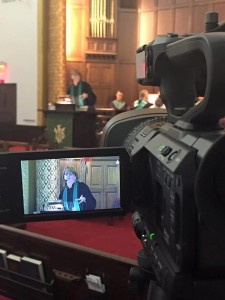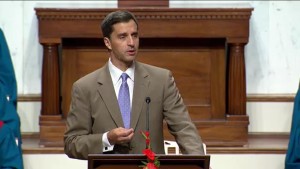The way Susan Sparks sees it, congregations are missing a huge opportunity to share the gospel by not livestreaming their worship services.
“We represent a messiah who used every available opportunity he had to reach out,” said Sparks, pastor at Madison Avenue Baptist Church in New York City. The internet “is the main communication channel these days — how can we not tap into this?”

With a high-tech camera rolling, Susan Sparks preaches a Sunday service at Madison Avenue Baptist Church in New York City. Sparks said she is deliberately including the church’s online members in her sermons. (Photo/Madison Avenue Baptist)
But Sparks isn’t pitching simply sticking a camera and microphone in the back of a sanctuary so that a handful of viewers can struggle through grainy images and muffled sermons and hymns.
Instead, she and a growing number of other ministers with webcasting experience now realize online viewers are not audiences, but members. And most importantly, Sparks said, they want to participate in, not just watch, those services.
They know this because it’s what livestream viewers tell them.
“So we call it our online congregation,” Sparks said.
Feeling included
Jim Somerville, senior pastor at First Baptist Church in Richmond, Va., said communication with his congregation’s online members must be a two-way street.
Somerville said he was reminded of this when he was contacted recently by a stranger from Raleigh, N.C.
“He reached out to me on Facebook Messenger — ‘any chance you are free for lunch?’”
It turned out the gentleman was a faithful member of First Baptist Church — online.
“He was telling me how he had got into the webcast and how it’s a regular part of his Sunday morning ritual,” Somerville said. “It’s amazing to me how and why people connect.”

Jim Somerville said awareness of the needs and interests of online and television viewers has changed the way he preaches at First Baptist Church in Richmond, Va. (Photo/courtesy of Jim Somerville)
First Baptist has both a telecast and a webcast of its services. Last May, Somerville said he directed the staff to become more intentional about including those who participate online.
Somerville now mentions the online community in his sermons and he regularly invites them to sign up for mailings and other ways of getting involved.
“Hundreds have said ‘yes, I want to be more connected,’” he said.
He’s also learning to use inclusive language to prevent those physically absent from feeling excluded by culturally or geographically specific references. That’s important when some are worshiping via the web in Africa, Europe and the Middle East, Somerville said.
First Baptist also invites online members to participate in communion.
Somerville tells the viewing congregation — which includes an estimated 30,000 television viewers — to fetch juice and a cracker at the appropriate time. He invites them to eat and drink right along with those in the sanctuary.
“I have heard people all over town say they got up to get a cracker and juice” at that moment, he said. “I heard from people who said they suddenly felt included.”
‘A great way to share’
Transforming livestreaming and other online ministries begins by considering the needs of those who connect through cyberspace, said Rodney Dunlap-Keener, who heads public relations and communications at Madison Avenue Baptist.
“When we first started, we didn’t think about the experience you had being a virtual member,” said Dunlap-Keener, who helped launch the church’s livestreaming program last fall.
Considering the needs of those members may lead to technological as well as ministerial changes.
On Wednesday, Madison Avenue Baptist launched a new section to its website making it easier for virtual members to connect to the church’s newsletter, podcast and other online offerings. It’s also a channel for sending prayer requests.
That global family portal is “a great way to share the radical message of Christ that we couldn’t always tap into in the four walls of our church,” Dunlap-Keener said.
‘Cyber hospitality’
But taking that message to its potential requires a methodical study of the needs of that online community, Sparks said.
Madison Avenue Baptist is undertaking that exploration with a $5,000 grant through Union Theological Seminary and the Lilly Endowment. With it, the church is seeking ways to enhance the experience of its online members.
The global family portal on the website is part of that and so was improving the quality of speakers used in the livestreaming process, Sparks said.
Sparks and her staff also are providing the online community ways to participate in ministries and education through Madison Avenue Baptist.
Cyber members are being invited to participate in letter-writing efforts to prisoners and members of the military, she said. During a park clean up in Harlem, the online congregation will be invited to volunteer in similar efforts in their hometowns.
Viewers also are being invited to tithe — and many are doing so, Sparks said.
“Two Sundays ago, I walked up to the camera and said ‘if you’re a part of our family, we need your help to turn the lights on,” she said.
The online avenue into the church provides another important ministry that the bricks-and-mortar version does, Sparks said — a spiritual refuge.
Based on feedback from online members located in rural areas, especially in the South, many are hungry for a progressive Christian perspective of faith. Some report a judgmental attitude in the congregations where they reside, she said.
“A lot are Baptist folks that are coming,” she said. “We can read that as we have put the fence up too high around the Baptist church.”
To meet all those needs requires the same effort online as it does for welcoming new members in church.
“We want to be hospitable. We want to be part of cyber hospitality.”



